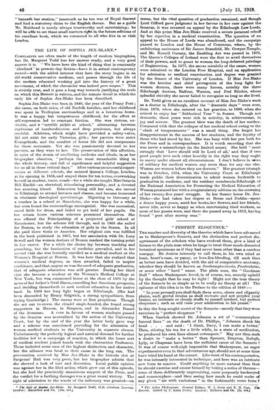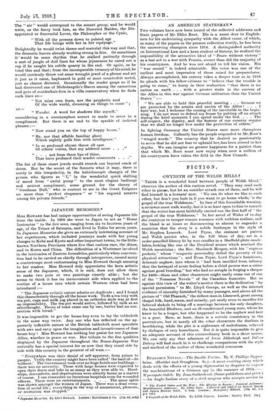" PERFECT ELOQUENCE."
THE number and diversity of the theories which have been advanced as to Shakespeare's Sonnets, and the distinction and perfect dis- agreement of the scholars who have evolved them, give a kind of licence to the plain man when he longs to treat these much-dissected botanical specimens as if they had never been other than a careless nosegay. He desires intensely to call them, in his own mind at least, heart's-ease, or pansy, or love-lies-bleeding, till such time as better men have decided, with the aid of comparative anatomy, whether they should be known as Southamploniensis, Pembrokeiae, or some other " hard " name. The plain man, the " Goodman Dull " whom Shakespeare loved, is of course, too, secretly upheld by the thought that he may be right ! Might not the true theory of the Sonnets be so simple as to be really no theory at all ? The epitome of this idea is in the Preface to the edition of 1640 :- " In your penman you shall finde them seren, cleere and eligantly plain, such gental strains as shall recreate and not perplex your braine, no intricate or cloudy stuffs to puzzell intelect, but perfect eloquence ; such as will raise your admiration to his praise."
Is this the long-sought secret of the Sonnets—merely that they Neese exercises in " perfect eloquence " ?
When Garrick showed Dr. 'Johnson a set of " commonplace funeral lines " on the death of Dr. Phillips, " Johnson shook his head . . . and said : I think, Davy,1 can make a better.' Then, stirring his tea for a little while, in a state of meditation, he produced his own lines almost extempore." May not then such a desire to " make a better " than Spenser, Drayton, Ralegh, Lyly, or Chapman have been the sufficient cause of the Sonnets ? It was of course well-nigh impossible that Shakespeare, an eager experimenter even in that adventurous age, should not at some time have tried his hand at the sonnet. Like most of his contemporaries, he was intensely interested in technique, and here was an intricate new form to master. Could anything be more natural than that he should exercise and amuse himself by taking a series of themes— some of them deliberately unpromising, some purposely hackneyed and commonplace—and then seeing how much he could make of any given " sir with variations " in the fashionable verse form ?
• The Arden Shakespeare, Gonerat Editors, Cr. 3, Craig and R, II. Case, TA. Sonnets. Edited by C. Knox rooler. London: Methuen and Co. [as. net.]
The " air " would correspond to the sonnet group, and he would write, as the fancy took him, as the Deserted Maiden, the Dis- appointed or Successful Lover, the Philosopher or the Cynic, " With all the persons down to palsied age That life brings with her in her equipage."
Delightedly he would twist theme and material this way and that, the dramatic leaven already working strong in him. Or sometimes it • would be some rhythm that he stalked patiently through a sort of jungle of dull lines for whose jejuneness he cared not a rap if he caught his subtle quarry in the end. Or again, as he tried this and that; from the incomparable treasury of his mind, he would carelessly throw out some wrought jewel of a phrase and set it just as it came, haphazard in gold or most counterfeit metal, just as chance dictated. Occasionally the reader gasps as if he had discovered one of Michelangelo's Slaves among the carnations and pots of maidenhair-fern in a villa conservatory when ho finds such lines as- " Not mine own fears, nor the prophetic soul Of the wide world, dreaming on things to come " ;
or- " Wander. A word for shadows like myself,"
smouldering in a commonplace sonnet or made to serve in a compliment. But there is no end to the sparkle of isolated phrases ;- " Now stand you on the top of happy hours."
" He, nor that Isffable familiar ghost Which nightly gulls him with intelligence."
" In so profound abysm throw all care Of others' voices, that my addered sense . . ."
. . . not from those lips of thine, That have profaned their scarlet ornaments .
The list of these unset jewels would stretch out beyond crack of doom. But be the secret of the Sonnets what it may, there is surely in this irregularity, in the kaleidoscopic changes of the person who figures as " I," in the wonderful quick shifting of mood from " awful pomp " to the most elegant badinage and neatest compliment, some ground for the theory of " Goodman Dull," who is content to see in the Great Enigmas no more than "perfect eloquence " or " his sugared sonnets among his private friends."



























 Previous page
Previous page